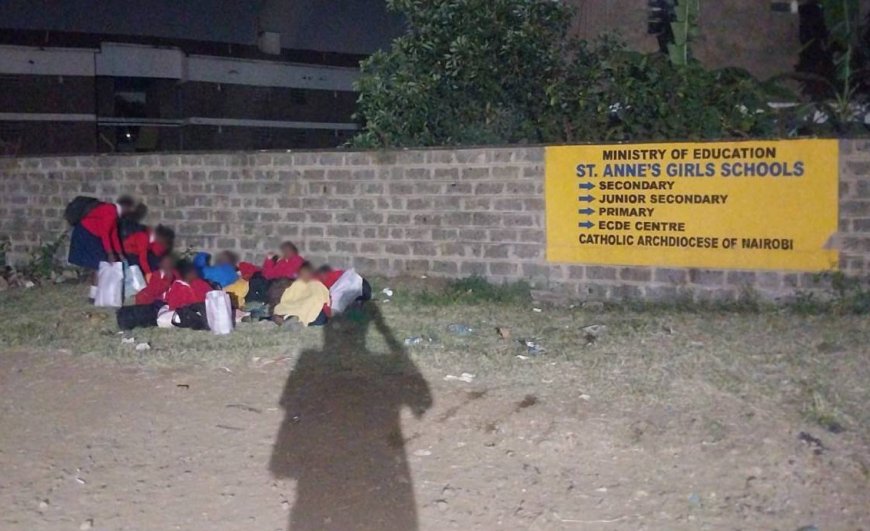The St. Anne's Girls School Incident and the Ongoing Struggle for Affordable Education
Students at St. Anne's Girls Secondary School in Nairobi were locked out due to unpaid fees, defying Ministry of Education guidelines that prohibit sending students home for financial reasons. The situation sparked public outrage and was resolved after intervention from local leaders and police. This incident highlights ongoing challenges in Kenya's education system, including the financial burden on families and the enforcement of government directives.

On the evening of January 8, 2025, an unsettling situation unfolded at St. Anne’s Girls Secondary School in Nairobi that left many Kenyans shocked and concerned.forced to spend part of the night in the cold, all because of outstanding school fees. This incident, which lasted well into the night, was not just about students facing the cold; it was a glaring violation of the Ministry of Education's clear directive against locking students out for unpaid fees.
The Ministry of Education has long emphasized that no student should be sent home or denied access to school due to financial constraints. However, despite these guidelines, the principal of St. Anne's Girls decided to lock out students who had either not paid their fees in full or had only made partial payments. In fact, some students had paid part of their fees but were still turned away, many having traveled long distances to get to school. It’s a tough pill to swallow, especially when we consider that education should be a right, not a privilege dependent on financial status.
This situation raises critical questions: Why are school administrators still defying clear directives from the Ministry? Is there a systemic issue that allows such practices to persist despite the government’s efforts to make education more accessible?
TRENDING;
2024 KCSE Results Announced: 1,693 A Grades, University Entry Updates
As night descended, hope began to fade for the stranded students. Among them was a girl who had traveled all the way from Kisii, only to be turned away for paying half of the required fees. Her story is not unique. There are likely countless others who are facing similar struggles across the country. It's not just about missing classes; it's about the emotional and psychological toll that such an experience inflicts. For these young minds, their education is a stepping stone to a better future, and being denied access—especially for reasons beyond their control—can have long-lasting effects.
Thankfully, the situation did not go unnoticed. Makadara Member of Parliament George Aladwa swiftly intervened after hearing about the standoff. His action to send a team to the school helped resolve the issue, and by Wednesday, the students were allowed back into the school. Aladwa’s intervention highlights the importance of local leadership and the role of elected officials in ensuring that public institutions adhere to regulations and safeguard citizens' rights.
While his quick response is commendable, it also raises the issue of how many more students are facing similar challenges without the support of such interventions. How many students are silently struggling with unpaid fees, potentially missing out on opportunities because of these financial barriers?
The St. Anne’s incident shines a light on the broader issue of education financing in Kenya. Parents are under enormous pressure to pay for their children’s education, especially in a system where public schools still charge significant fees. The government has made efforts to ease this burden through initiatives like eCitizen, which allows for digital fee payments and exemptions from transaction charges. However, these measures have not been enough to solve the problem of affordability for many families.

Moreover, there is an ongoing struggle between the Ministry of Education’s directives and the reality on the ground. Schools face financial pressures of their own, but this should never come at the expense of the students’ education. Clearer and stricter enforcement of policies, as well as increased government support, is needed to ensure that no student is denied their right to education.
This incident is a wake-up call for all stakeholders in the education sector. First, the Ministry of Education must ensure that their policies are not only clear but also properly enforced at the ground level. There should be penalties for schools that continue to violate these guidelines. Secondly, there needs to be more focus on providing affordable educational options for families. While digital loans have become a quick fix for many, they are often not enough to bridge the gap, and the cycle of debt continues.
Finally, we must all take a stand to support and protect students. Whether you're a parent, an educator, or a concerned citizen, it's crucial that we come together to demand accountability and push for systemic changes that prioritize the well-being and education of our youth.
The ordeal at St. Anne's Girls Secondary School should not be another isolated incident. It must serve as a catalyst for reform and a reminder that every student deserves an equal chance to learn, without fear of being locked out due to financial hardship.
Let us continue to speak out, hold authorities accountable, and push for an education system that truly serves the needs of all students.
Read More:
- Kenya Revenue Authority Probes Morara Kebaso Over Alleged Ksh186M Tax Evasion
- What Is Love Bombing? Recognize the Signs and Break Free from Toxic Relationships
What's Your Reaction?













































































































